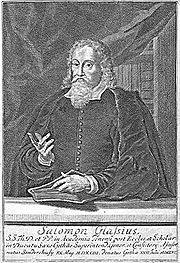
Salomo Glassius
Encyclopedia

Germany
Germany , officially the Federal Republic of Germany , is a federal parliamentary republic in Europe. The country consists of 16 states while the capital and largest city is Berlin. Germany covers an area of 357,021 km2 and has a largely temperate seasonal climate...
theologian and biblical
Bible
The Bible refers to any one of the collections of the primary religious texts of Judaism and Christianity. There is no common version of the Bible, as the individual books , their contents and their order vary among denominations...
critic born at Sondershausen
Sondershausen
Sondershausen is a town in Thuringia, Germany, capital of the Kyffhäuserkreis district, situated about 50 km north of Erfurt. On 1 December 2007, the former municipality Schernberg was incorporated by Sondershausen....
, in the principality of Schwarzburg-Sondershausen
Schwarzburg-Sondershausen
Schwarzburg-Sondershausen was a small principality in Germany, in the present day state of Thuringia, with capital at Sondershausen.-History:...
.
In 1612 he entered the University of Jena. In 1615, with the idea of studying law, he moved to Wittenberg
Wittenberg
Wittenberg, officially Lutherstadt Wittenberg, is a city in Germany in the Bundesland Saxony-Anhalt, on the river Elbe. It has a population of about 50,000....
. In consequence of an illness, however, he returned to Jena after a year. Here, as a student of theology
Theology
Theology is the systematic and rational study of religion and its influences and of the nature of religious truths, or the learned profession acquired by completing specialized training in religious studies, usually at a university or school of divinity or seminary.-Definition:Augustine of Hippo...
under Johann Gerhard
Johann Gerhard
Johann Gerhard was a Lutheran church leader and Lutheran Scholastic theologian during the period of Orthodoxy.-Biography:He was born in the German city of Quedlinburg...
, he directed his attention especially to Hebrew
Hebrew language
Hebrew is a Semitic language of the Afroasiatic language family. Culturally, is it considered by Jews and other religious groups as the language of the Jewish people, though other Jewish languages had originated among diaspora Jews, and the Hebrew language is also used by non-Jewish groups, such...
and the cognate dialects; in 1619 he was made an adjunctus of the philosophical faculty, and some time afterwards he received an appointment to the chair of Hebrew.
From 1625 to 1638 he was superintendent in Sondershausen; but shortly after the death of Gerhard (1637) he was, in accordance with Gerhard's last wish, appointed to succeed him at Jena. In 1640, however, at the earnest invitation of Duke Ernest the Pious
Ernest I, Duke of Saxe-Gotha
-Family and children:In Altenburg on 24 October 1636, Ernst married his cousin Elisabeth Sophie of Saxe-Altenburg. As a result of this marriage Saxe-Gotha and Saxe-Altenburg were unified, when the last duke of the line died childless in 1672. Ernst and Elisabeth Sophie had eighteen children:#...
, he removed to Gotha
Gotha (town)
Gotha is a town in Thuringia, within the central core of Germany. It is the capital of the district of Gotha.- History :The town has existed at least since the 8th century, when it was mentioned in a document signed by Charlemagne as Villa Gotaha . Its importance derives from having been chosen in...
as court preacher and general superintendent in the execution of important reforms which had been initiated in the ecclesiastical and educational establishments of the Duchy
Saxe-Gotha
Saxe-Gotha was one of the Saxon duchies held by the Ernestine of the Wettin dynasty in the former Landgraviate of Thuringia. The ducal residence was erected at Gotha....
. The delicate duties attached to this office he discharged with tact and energy; and in the Syncretistic Controversy, by which Protestant Germany was so long vexed, he showed an unusual combination of firmness with liberality, of loyalty to the past with a just regard to the demands of the present and the future.
His principal work, Philologia sacra (1623), marks the transition from the earlier views on questions of biblical criticism to those of the school of Spener
Philipp Jakob Spener
Philipp Jakob Spener was a German Christian theologian known as the "Father of Pietism."...
. It was more than once reprinted during his lifetime, and appeared in a new and revised form, edited by J. A. Dathe (1731-1791) and G. L. Bauer at Leipzig
Leipzig
Leipzig Leipzig has always been a trade city, situated during the time of the Holy Roman Empire at the intersection of the Via Regia and Via Imperii, two important trade routes. At one time, Leipzig was one of the major European centres of learning and culture in fields such as music and publishing...
. Glassius succeeded Gerhard as editor of the Weimar Bibelwerk, and wrote the commentary on the poetical books of the Old Testament
Old Testament
The Old Testament, of which Christians hold different views, is a Christian term for the religious writings of ancient Israel held sacred and inspired by Christians which overlaps with the 24-book canon of the Masoretic Text of Judaism...
for that publication. A volume of his Opuscula was printed at Leiden in 1700.
He died in Gotha.

